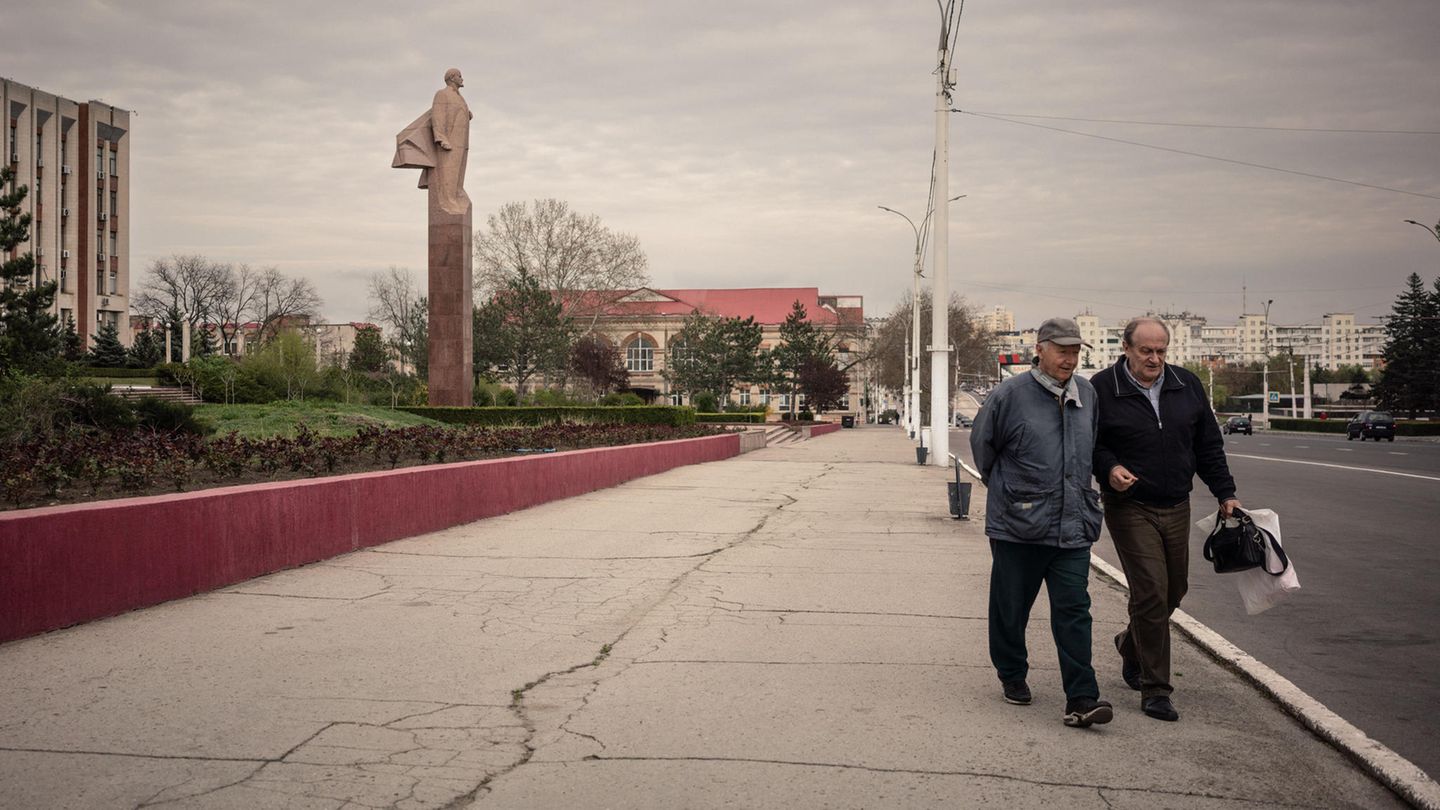First Ukraine, soon Moldova? The small country has been under pressure from Russia for years. Now the breakaway region of Transnistria appears to be working on secession. According to Russian media, separatists are asking the Kremlin for “protection.” A GEO team that traveled to Moldova and Transnistria in 2022 learned how torn the region is
by Nik Afanasjew
The Hotel “National” in the capital Chișinău is emblematic of Moldova’s dilemma. During Soviet times, the striking concrete building was called “Intourist,” but today it stands empty. After the start of the war in Ukraine, unknown people whitewashed the twelve upper floors in Ukrainian blue and yellow. Shortly afterwards, other unknown people painted over the top five floors: three in black, two in orange – this is what the Russian military’s Ribbon of George looks like.
There was great excitement in Moldova until one morning the St. George’s Ribbon disappeared and all the top five floors appeared blackened. Now, viewed from below, six yellow floors, one blue and five black shine – a barometer of Moldovan support for Ukraine.
When a woman comes by and notices our interest in the Hotel National, she starts blustering. “It’s a shame that they ban Russian symbols here!” Only recently did Moldovan President Maia Sandu say that the St. George Ribbon belongs in the dustbin of history. “Who do you want to dump on the garbage heap?” the woman with a bright red face shouts so loudly that passers-by jump to the side. The woman claims that she is hosting refugees from Ukraine herself, but what is going on here is really not happening at all. She thinks everyone should be allowed to show their symbols. “And Europe should stay out of it!”
The small state of Moldova, with around 2.6 million inhabitants, has no army to speak of. With the breakaway territory of Transnistria in the east controlled by Russia and guarded by Russian troops, he is instead suffering from the same problem that Ukraine had with the pro-Russian separatist republics in Donbas before the war began. Last but not least, constant threats from the Kremlin make people in Moldova fear that Ukrainian history could repeat itself for them.
Mathias von Tucher reports on how complicated matters often become in Moldova. The Munich resident has lived in the country for years and is port manager at the Giurgiulești International Free Port, located on the just 460 meters of Danube banks that the landlocked state of Moldova can offer. Von Tucher receives people in his office in the free port, rushes to the window, looks at a thick cloud of smoke in the distance and asks the long room behind him: “Is there a fire there?” He pulls out his phone and inquires. No, he immediately reassures, “it’s just an old diesel locomotive.” In Moldova you never know where the next smoke will rise.
The Giurgiulești International Free Port is located on the 460 meter long Danube access to the Republic of Moldova
© Evgeny Makarov for GEO
The port boss holds a cup of his hometown, clutches the Chinese Tower of the English Garden and points outside to the border triangle between Moldova, Romania and Ukraine. “Moldova got this piece of the Danube through a territory swap from Ukraine,” explains von Tucher.
Ships are already calling at four terminals and a fifth is currently being built. The port handled 1.4 million tons of goods last year. The war in Ukraine is now causing him to export Ukrainian wheat more frequently. “There’s a lot going on here,” says von Tucher and then points outside, to the gray border town that surrounds the harbor. The town has ten times as much tax revenue as other communities in the area, “but you can’t tell by looking at it.”
He now makes an inspection visit to the port, greets workers, inspects loading ramps and explains: “Anyone who wants to become a teacher or doctor in this country often pays thousands of euros just to get the job. He wants to get it back.”
This created a spiral of corruption that almost brought his port into trouble because judges wanted to give in to the absurd demands of former investors. The port itself belongs to the European Bank for Reconstruction and Development (EBRD). “Moldova is not participating in the European sanctions against Russia,” explains von Tucher, “but we don’t want to be used to circumvent them either.” Everything has to be weighed up on all sides in a country like Moldova, which is already geographically caught between all two stools. And while von Tucher is talking, a Ukrainian soldier, less than 50 meters away, is watching him through binoculars. You can even see his grumpy expression; the civilians at the border fence are probably annoying him.
A trip to the separatist region of Transnistria shows how big Moldova’s dilemma is. The strip of land squeezed between the rest of Moldova and Ukraine is a classic de facto regime, with its own currency, administration and army – but not recognized by the world.
The hammer and sickle in his flag set the direction, Lenin watches over the capital Tiraspol, there are hardly any people to be seen. It is so orderly and quiet in Transnistria, as if someone had sucked all the air out of the atmosphere, as if neither historical developments nor physical laws counted here. Perhaps not coincidentally, a museum in the fortress of the Transnistrian town of Bender claims that Baron von Munchausen started his famous cannonball ride from there. In this fortress there is a weapons museum in which the Russian “soldiers and liberators” are thanked under an oversized St. George ribbon. The museum security guard asks ambiguously whether they “paid close attention” and “learned a lot” during the visit.
#Subjects
